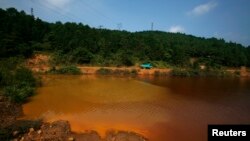BEIJING —
China’s government acknowledged the existence of cancer villages earlier this year, but that recognition has not changed life in Wuli Village, where residents say water pollution is causing severe illness.
Wei Dongying said cancer rates in her hometown have spiked because of pollution. One of her neighbors was the most recent to fall ill.
She said he was more than 70 years old and died of esophageal cancer last month.
Wuli, in Zhejiang Province is one of hundreds of cancer villages in China, where industrial pollution has caused high rates of disease. Cancer mortality rates in China have risen 80 percent over the last 30 years, and the government has deemed half of the country’s rivers and lakes unsafe for human contact. Soon after chemical factories moved into Wuli, the tap water at times turned red, and fish in the river began to die.
Since then Wei said more than 10 percent of the village’s population has died of cancer. She keeps what she calls a diary of death, with thumbprint signatures of people who have fallen ill.
She said there is no solution but to keep a record and let others know what is happening.
Wei and her husband, Shao Guantong, go fishing at night.
She said they bring their flashlights on walks along the riverbanks, which let them see the foam and froth on the water’s surface.
Wei has sent water samples and her documentation of the dead and dying to the central government. In February China officially acknowledged the existence of cancer villages in the country’s five-year plan. Environmental groups estimate there are more than 400 cancer villages in China. China’s Ministry of Environment announced a clampdown on the use of 58 toxic chemicals and promised a crackdown on polluting factories.
For Wei the government’s recognition has come too late.
"What use is that?" Wei wanted to know. "Can the government save a single life through this recognition?"
She said officials have made several promises over the last decade: factories will be required to use a waste water treatment facility; the government will move the factories out of the village or the villagers will be relocated. Wei said none of these promises have been fulfilled, and instead, authorities have vowed to quell dissent.
The local government has threatened the villagers of Wuli with unspecified consequences if they continue their protests, and the windows in Wei’s home were recently smashed. She said authorities will not be able to silence her as long as the chemical factories continue to discharge and her neighbors keep getting sick.
Wei Dongying said cancer rates in her hometown have spiked because of pollution. One of her neighbors was the most recent to fall ill.
She said he was more than 70 years old and died of esophageal cancer last month.
Wuli, in Zhejiang Province is one of hundreds of cancer villages in China, where industrial pollution has caused high rates of disease. Cancer mortality rates in China have risen 80 percent over the last 30 years, and the government has deemed half of the country’s rivers and lakes unsafe for human contact. Soon after chemical factories moved into Wuli, the tap water at times turned red, and fish in the river began to die.
Since then Wei said more than 10 percent of the village’s population has died of cancer. She keeps what she calls a diary of death, with thumbprint signatures of people who have fallen ill.
She said there is no solution but to keep a record and let others know what is happening.
Wei and her husband, Shao Guantong, go fishing at night.
She said they bring their flashlights on walks along the riverbanks, which let them see the foam and froth on the water’s surface.
Wei has sent water samples and her documentation of the dead and dying to the central government. In February China officially acknowledged the existence of cancer villages in the country’s five-year plan. Environmental groups estimate there are more than 400 cancer villages in China. China’s Ministry of Environment announced a clampdown on the use of 58 toxic chemicals and promised a crackdown on polluting factories.
For Wei the government’s recognition has come too late.
"What use is that?" Wei wanted to know. "Can the government save a single life through this recognition?"
She said officials have made several promises over the last decade: factories will be required to use a waste water treatment facility; the government will move the factories out of the village or the villagers will be relocated. Wei said none of these promises have been fulfilled, and instead, authorities have vowed to quell dissent.
The local government has threatened the villagers of Wuli with unspecified consequences if they continue their protests, and the windows in Wei’s home were recently smashed. She said authorities will not be able to silence her as long as the chemical factories continue to discharge and her neighbors keep getting sick.




